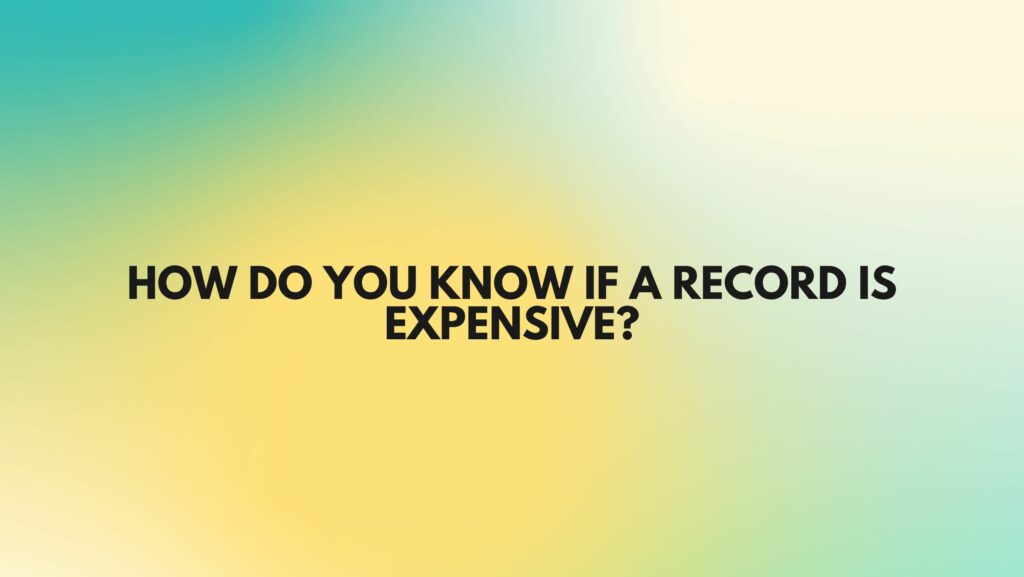Collecting vinyl records is a popular and rewarding hobby for many music enthusiasts. Whether you’re a seasoned collector or just starting your vinyl journey, one of the essential skills is the ability to determine whether a record is expensive or not. Vinyl records can vary significantly in price, with some rare editions commanding a high premium, while others remain more affordable. In this article, we will explore the key factors that influence the cost of a vinyl record and provide guidance on how to assess whether a record is expensive.
Factors Influencing the Cost of a Vinyl Record
Several factors play a crucial role in determining the price of a vinyl record:
- Rarity: One of the most significant factors is the rarity of the record. Limited pressings, first editions, promotional copies, or records with unique features are typically more valuable because of their scarcity. For example, an album released in a small quantity or a special edition of a classic record can command a high price.
- Artist and Genre: The popularity and significance of the artist or band, as well as the genre of music, can greatly influence the cost of a record. Albums by iconic musicians or within specific sought-after genres like jazz, classic rock, and punk are generally more expensive.
- Condition: The condition of a vinyl record is a critical factor in determining its value. Records in mint or near-mint condition, with minimal wear, scratches, or other defects, are more valuable than those in poor condition.
- Historical Significance: Some records gain value due to their historical significance. This could include albums with iconic cover art, records associated with groundbreaking artists or movements, or those with unique historical context.
- Demand: High demand for a particular record can drive up its price. Records that are considered classics, fan favorites, or have a cult following can be more expensive.
- Pressing Variations: Different pressings of the same album can have varying values. Early pressings, mono versions, records from specific countries, and records with unique labels or catalog numbers may be more desirable to collectors.
- Special Features: Records with special features, such as colored vinyl, inserts, gatefold covers, or bonus tracks, can have higher prices.
How to Determine If a Record Is Expensive
- Do Your Research: Start by researching the record you’re interested in. Online marketplaces, record collecting forums, and price guides can provide valuable information on the record’s current market value.
- Compare Prices: Look for the same record from various sellers and sources. Comparing prices will help you gauge the average price range for the record.
- Condition Matters: Always consider the condition of the record. Records in excellent or mint condition are more valuable than those with visible wear or damage. Be sure to factor this into your assessment of its value.
- Consider Historical Significance: If the record has a unique historical significance, such as being a limited edition, a first pressing, or an album with iconic cover art, it is likely to be more expensive.
- Analyze Demand: If the record is in high demand and there’s a limited supply, it will likely be pricier. Check whether the record has a strong collector’s market.
- Consult Experts: If you’re unsure about a record’s value, seek advice from experienced collectors, dealers, or appraisers. They can provide insights and help you make an informed decision.
- Check Online Marketplaces: Websites like Discogs, eBay, and specialty record stores are excellent places to research prices and see what records are selling for. You can use these platforms to gauge market value.
- Beware of Overpricing: Sometimes, sellers may overvalue their records. Don’t be swayed by an inflated price tag. Take your time to find a reasonable offer.
In Conclusion
Determining if a record is expensive involves careful research, consideration of various factors, and an understanding of the dynamics of the vinyl record market. While some records are indeed expensive due to their rarity, condition, demand, and historical significance, others may be more affordable and accessible. Building your vinyl collection can be a rewarding experience, and with the right knowledge and research, you can make informed decisions about which records to add to your collection without breaking the bank.


